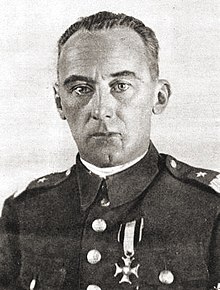Władysław Bortnowski
| Władysław Bortnowski | |
|---|---|
 |
|
| Born |
12 November 1891 Radom, then Russian Empire, now Poland |
| Died | 21 November 1966 (aged 85) Glen Cove, New York, USA |
| Allegiance |
|
| Service/branch | Polish Army |
| Years of service | 1914–1945 |
| Rank |
|
| Commands held | Pomorze Army |
| Battles/wars |
World War I |
| Awards |
Order of Virtuti Militari, Silver Cross; Order of Polonia Restituta Commander's Cross with Star; Order of Polonia Restituta Commander's Cross; Cross of Valour; Gold Cross of Merit; Cross of Independence; Grand officier de la Légion d'honneur; Order of Lāčplēsis II class |
| Executive Director of the Józef Piłsudski Institute of America | |
|
In office 1961–1962 |
|
| Preceded by | Henryk Korab-Janiewicz |
| Succeeded by | Henryk Korab-Janiewicz |
| Personal details | |
| Resting place | |
World War I
Polish-Ukrainian War
Polish-Bolshevik War
World War II
Władysław Bortnowski (November 12, 1891, Radom – November 21, 1966 Glen Cove, New York) was a Polish historian, military commander and one of the highest ranking generals of the Polish Army. He is most famous for commanding the Pomorze Army in the Battle of Bzura during the invasion of Poland in 1939. Also notable for serving as president of the Józef Piłsudski Institute of America between 1961 and 1962.
Bortnowski was born on November 12, 1891 in Radom, Congress Poland, Russian Empire. Upon graduating from a gymnasium in Zhytomir, he enrolled into the Moscow State University as a medical student, only to transfer after one year to the Jagiellonian University in Kraków. There, he completed his medical studies. From 1908, he was a member of the Union for Active Struggle, and from 1912, a member of the Riflemen's Association. In 1913, he completed his training as a NCO, followed by his graduation as an officer in the ranks of the Rifleman's Association. With the outbreak of the Great War, Bortnowski interrupted his higher studies and joined the Polish Legions where he commanded a platoon in the ranks of the 1st Infantry Regiment. Next, as a Second Lieutenant, he commanded a company in the 5th Infantry Regiment, followed by a position as adjutant of the 7th Infantry Regiment of the 1st Brigade. On Christmas Day 1914, Bortnowski was wounded at the battle of Łowczówek. Following the events of the Oath Crisis in 1917, he was arrested and interned at the Fort Beniaminów POW camp in Beniaminów from July 1917 until his release in April 1918. From his release from Beniaminów to October 1918, Bortnowski acted as commander of the Kraków branch of the Polish Military Organisation.
...
Wikipedia
